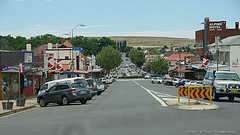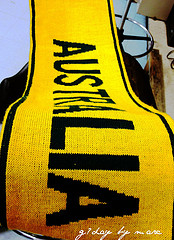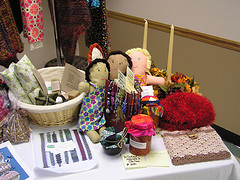Archive for the ‘online business’ Category
Monday, March 3rd, 2014

Photo credit; Tatiana Gerus on Flickr
When Jane Cay bought an existing retail business in the small New South Wales town of Cooma in 2004, it was an eclectic mix of saddlery, Akubra hats and women’s fashion and employed five staff.
After removing the outfitters merchandise and honing in on women’s fashion, the business began to grow solidly at a rate of 10-20% per year. And in 2006, given the growth in online business, Cay made the decision to take Birdsnest online.
“We quickly realised that we weren’t in the business of selling dresses — we were in the business of solving a woman’s wardrobe dilemma,” Cay says.
She did a lot of online research to get her website up and running and develop the brand, focusing on giving online customers the same high standard of customer service that the in-store customers received.
Cay’s thorough planning and commitment to the website and customer service has paid off: since the website started, the business has grown to more than 100 team members, the website records five million page views or 500,000 visits every month, and it sells to people all over Australia and the world.
To read more about this story, click here.
Tags: Australia, Birdsnest, business, Cooma, New South Wales, online
Posted in Australia, business, E-mail & the internet, internet usage, online business, Online Sales, online shopping, online stores, selling online, Success story | No Comments »
Friday, February 28th, 2014
 Online success has led to talks of expansion for Anna Blandford and Gareth Meney of Able and Game.
Online success has led to talks of expansion for Anna Blandford and Gareth Meney of Able and Game.
Blandford, from Melbourne, has been selling cards and stationary from Able and Game for four years and proudly names Nepal as a country she sells to.
“We now wholesale to the UK, US and New Zealand,” she said. “We are always looking at expansion and have recently attended trade shows in the UK.”
The reach of the internet allows her and other Australian small business owners online to count the entire world as their market.
To read more about this story, click here.
Tags: Able and Game, Australia, business, cards, homemade, online
Posted in Australia, business, E-mail & the internet, internet usage, online business, Online Sales, online shopping, online stores, selling online, Success story | No Comments »
Wednesday, February 26th, 2014

Photo credit; Tup Wanders on Flickr
Global business trends affect all businesses. Here are eight trends that could affect your Australian online business in 2014, according to startupsmart.com.au.
Privacy laws
The onus is now on business owners to ensure they know what their service providers are doing with respect to keeping and sharing your customers and business data both on and offshore.
Cookies policies and active notifications
Notification requirements are being reviewed and regulation is making more business owners obtain active consents where certain customer information is collected and customer behavior is recorded. This means you need to know when you need your customer to actively agree to your terms rather than just post them on your website. It will also impact what your business collects, why you collect it and what you do with it.
Copyright reform
Make sure you know where your content and images come from. This is becoming an increasingly monitored (and complained about) issue with the increase in “sharing” in social media.
New cyber security laws
The European Union (EU) and the United States (US) are trying to work on new policies to address cyber crime. The EU is working on reforms to get member countries to agree to have compulsory reporting of cyber attack crimes to national authorities. They want to have an arrangement that countries will give up nationals who commit such crimes against EU or US but this is meeting some resistance.
Data collection
There is and will be more regulation in relation to tracking systems, particularly those permitted by large tech companies. Opting out of tracking will be more and more difficult as larger corporates will look to improve their ability to collect personal data for advertising databases.
What does this mean for you? It will be harder to protect yourself and your customers’ information online. You are responsible for protecting your customer’s information so your security systems and those of your service provider will need to be robust particularly where international providers or customers are involved.
More Local Regulation for Online Businesses
Australian regulators are hitting out as business use of the internet grows. Everything from tax collection, legislation compliance, consumer protection and privacy are all on the radar among some of the other legislative changes that are continuing to be examined in 2014. You can be sure that tax revenue will be top of the agenda!
Online businesses to be targeted for taxes in other countries
With growth in sales at bricks-and-mortar shops shrinking, and purchasing on the internet growing daily, governments are looking to find ways to tap into the sales revenue. By 2017 global mobile commerce transactions will exceed US$3.2 trillion up from $1.5 trillion in 2013.
Be aware of the tax reform proposals where your online business has customers. You don’t want to be caught out.
Crowdfunding
This new innovation is virtually unregulated so far in Australia and is growing faster than any other funding source for businesses. It’s making entry costs for individuals who want or have started businesses more feasible — it’s becoming a global way of accessing funding.
Watch out for this new way that businesses are finding investors to help them grow.
To read more on this story, click here.
Tags: 2014, Australia, business, online, trends
Posted in Australia, business, E-mail & the internet, online business, Online Sales, online shopping, online stores, selling online | No Comments »
Friday, February 21st, 2014

Photo credit; Beads for Beds on Flickr
For Kirsten Devitt, starting a business was a dream come true, but she couldn’t have done it without the power of online retail.
“Once you’re online, you can build your confidence slowly,” says Devitt, who is from Brisbane, and who sells handmade jewellery from her store EachToOwn.
About two years old, Devitt’s online business allows her to earn a decent income while caring for her young son. But she would never have considered becoming a business owner if she had to start with a physical store, a staff and a business loan.
“There is too much at stake in owning a store,” she said. “I couldn’t afford to outlay a crazy amount of money for something that might fail.”
To read more about this story, click here.
Tags: Brisbane, EachToOwn, Etsy, handmade jewelry
Posted in Australia, business, E-mail & the internet, internet usage, online business, Online Sales, online shopping, online stores, selling online, Success story | No Comments »
Thursday, February 20th, 2014

Photo credit; Marc Falardeau on Flickr
Conservative US think tank The Heritage Foundation has named Australia as third freest nation in which to do business, putting the country behind Hong Kong and Singapore, and above New Zealand and Taiwan in fourth and fifth place.
”With an economy that benefits from sound fundamentals including monetary stability, low public debt, and a vibrant employment market, Australia has weathered the global economic uncertainty well,” the Foundation said.”Openness to global trade and investment is firmly institutionalised, supported by a relatively efficient entrepreneurial framework and a well-functioning independent judiciary.”
The US dropped from the world’s 10th to 12th freest of the 186 nations surveyed.
Heritage Foundation analyst Bryan Riley said that while in the organisation’s view Labor’s stimulus package during the global financial crisis had been a negative, Australia’s bipartisan commitment to free trade and support for foreign investment, as well as its relatively low tax rates, were enough to keep it near the top.
To read more on this story, click here.
Tags: Australia, business, free, Hong Kong, New Zealand, online, Singapore, Taiwan, The Heritage Foundation, United States, USA
Posted in Australia, business, E-mail & the internet, Federal Government, internet usage, online business | No Comments »
Monday, February 17th, 2014

Photo credit; Lydia on Flickr
The Business Spectator’s Robert Gottliebsen has predicted that as the race heats up between Australia Post, Toll, Linfox and DHL for parcel delivery of online purchases, online retailers will benefit from the competition.
Currently, Australia Post holds a whopping 80% of the market, but the other players are making their run, Gottliebensen says.
He also predicts that brick and mortar shopping centres are in for a rude awakening as online sales continue to grow.
“As the online industry moves to ten per cent and higher proportions of the retail trade, economies of scale will kick in and drive online market share even further. Australia has been a major investor in shopping centres and I don’t think that the overall shopping centre industry fully appreciates the magnitude of what is going to hit them,” Gottliebsen says.
To read more on this story, click here.
Tags: Australia Post, business, DSL, Linfox, online, Toll
Posted in Australia, business, E-mail & the internet, Federal Government, internet usage, online business, Online Sales, online shopping, online stores, selling online | No Comments »
Wednesday, February 12th, 2014

Photo credit; SEOPlanter on Flickr
More Australians continue to to turn toward online shopping, according to a study done by the ARC Centre of Excellence for Creative Industries and Innovations and Swinburne University of Technology as part of the World Internet Project (WIP).
The study looked at online purchasing habits between 2007 and 2013 and found that three out of 10 Aussies shop online at least once per week now.
“After an apparent plateau between 2009 and 2011, our latest survey confirms that online shopping by Australian consumers grew strongly again between 2011 and 2013,” said Dr Scott Ewing of the centre and Swinburne University of Technology.
The average number of online purchases by Australians grew 46.2 per cent from 2011 to 2013, and the monthly value of average purchases grew 5.8 per cent, to $218.
Men spend more online, averaging $229 a month, while women on average spend $204.
“The good news for Australian businesses is that local retailers are maintaining their share of this growth as Australian consumers maintain their strong preference for shopping with domestically based websites,” Dr Ewing said.
“Three out of 10 Australians now shop online every week, or more often, compared with two in 10 New Zealanders and one in 10 Swiss.
To read more on this story, click here.
Tags: Australia, business, customers, online, shopping
Posted in Australia, business, E-mail & the internet, internet usage, online business, Online Sales, online shopping, online stores, selling online | No Comments »
Saturday, February 8th, 2014

Photo credit; Normanack on Flickr
While big businesses in Australia continue to be prone to failure, their smaller counterparts are doing well, starting out small and gaining a dedicated following of customers the old-fashioned way.
These small mum and pop shops sell anything from handcrafted goods to greeting cards to furniture, utilizing their online presence to sell their wares both locally and around the world.
“These businesses create niche products that may only tailor to the one per cent. But when you look at the world as your customer base, that one per cent is big business,” says Jason Chuck from Etsy Australia, which supports businesses in selling their handmade goods.
Figures from Etsy Australia show that 90% of sellers are women.
The online marketplace launched in Australia in 2005 and now has tens of thousands of sellers, with 60 per cent of orders going to international buyers.
Markets and online stores are allowing artistic Australians to start small and find their niche customer base before expanding.
To read more about this story, click here.
Tags: Australia, business, Etsy, online, small business
Posted in Australia, business, E-mail & the internet, online business, Online Sales, online shopping, online stores, selling online, Success story | No Comments »
Friday, January 3rd, 2014

Photo credit; Snap on Flickr
Freelancer.com founder Matt Barrie has been named a business winner on Yahoo! Finance Australia’s list of business winners and losers for 2013.
Barrie enjoyed one of the year’s most successful IPOs when shares in the online freelancing network shot as high as $2.60 on their first day.
Coming off a 50 cent issue price, the Freelancer frenzy briefly made the company a billion-dollar concern.
Barrie holds 46% of the company and, even with Freelancer shares now trading around $1.30, his stake is still worth approximately $260 million.
To read more on this story, click here.
Tags: Australia, business, Freelancer.com, IPO, Matt Barrie, online, Yahoo!
Posted in Australia, business, E-mail & the internet, internet usage, investment, online business, Success story, technology, web-based | No Comments »
Wednesday, January 1st, 2014

Photo credit; Alisa on Flickr
Online freelance agency oDesk.com, which recently merged with rival Elance.com, is considering opening an office in Australia to compete with Australia-based Freelancer.com.
Matt Cooper, oDesk’s vice-president of its international division, said Australia was now the company’s second-largest market globally with more than 50,000 registered clients. He also mentioned that oDesk, which is based in Silicon Valley, has twice the penetration rate in Australia as compared with its home market of the US.
To read more on this story, click here.
Tags: Australia, business, Freelancer.com, oDesk, online
Posted in Australia, business, E-mail & the internet, internet usage, online business | No Comments »









